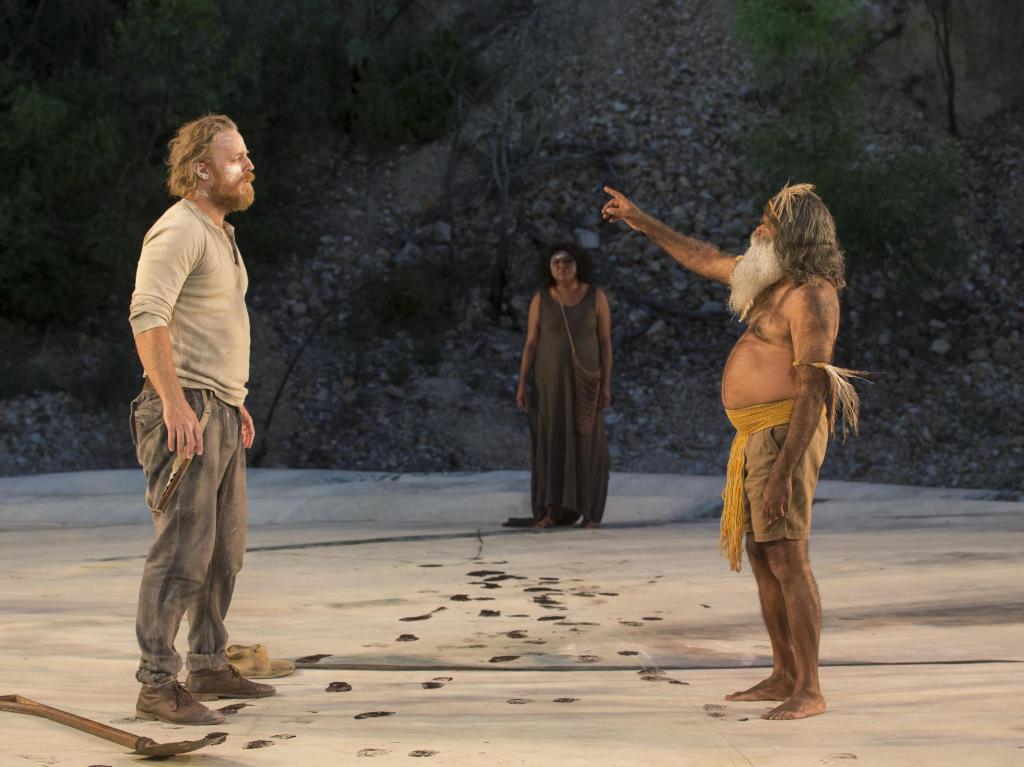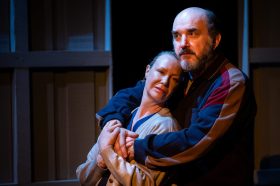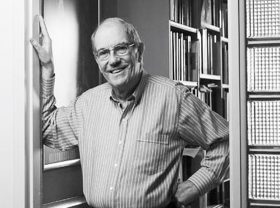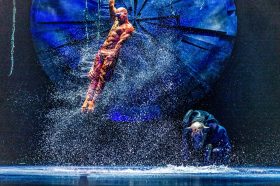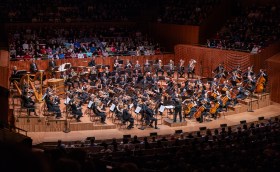Nathaniel Dean, Ningali Lawford-Wolf and Stephen Goldsmith in The Secret River. Photo: Shane Reid
The roar of gunfire has greater resonance under the stars than in a theatre. When white settler William Thornhill (Nathaniel Dean) fires his gun in anger after the local Dharug people have raided his crops (planted on top of and destroying their own food supply), the impact of the shot is palpable. The audience at this production of The Secret River, performed outdoors, at Anstey Hill Quarry, flinch at the sound, which bounces off a towering cliff face and echoes in our hearts.
Performed on Kaurna land, with the wind whispering counterpoints to the script in the boughs of the surrounding gum trees, the sight and sound of a whitefella taking up arms against one of this country’s First Peoples is a shocking and sobering moment. It’s one thing to know intellectually of the atrocities committed by our founding fathers during their rapacious colonisation of this land; it’s another thing entirely to feel it.
Adapted by Andrew Bovell from Kate Grenville’s acclaimed novel of the same name, Sydney Theatre Company’s The Secret River premiered in 2013 to great acclaim. It opens the 2017 Adelaide Festival in an eagerly awaited co-production with State Theatre Company South Australia.
The Secret River is a story of colonial displacement, destruction and corruption as seen through white eyes. Our protagonists are the Thornhill family – the ex-convict William, his passionate but homesick wife Sal (Georgia Adamson) and children Willie (Sebastien Skubala) and Dick (Jules Dawson). After enduring grinding poverty in London before being arrested and transported to the penal colony of New South Wales, Thornhill has finally earned his freedom. While Sal longs to return to England, Thornhill has become enamoured of a patch of land on the Hawkesbury River; “100 acres spread flat by the water and a rise behind it with a handsome view”. He dreams of becoming a landowner, of leaving a legacy for his sons – a dream impossible in the filthy streets of London. But the land Thornhill wants for himself and his family has prior occupants, and as his actions to secure a future become increasingly more desperate, Thornhill’s legacy ultimately becomes one which all white Australians are still grappling with today.
Transposing the work from a proscenium arch theatre onto country not only gives The Secret River greater weight, it also casts sharper light on to the production’s ingenious and assured stagecraft. While the striking central element of Stephen Curtis’ set – a great gum tree – is no longer required, having been replaced by rock and real trees – other aspects of the production (buckets of water which the characters splash in to evoke the sounds of the river, stones striking metal at the sides of the stage as other stand centrally and mime digging the earth) have greater resonance. The live score, performed by Iain Grandage on piano and cello, is haunting and exquisite. Other effects are provided by nature: a dragonfly flits across the stage, wings shining as the play begins; later, as Thornhill points at the moon and reflects that it’s the same moon which hangs in London’s sky, a real crescent moon shines overhead.
Throughout the performance, the Thornhills are forever marking ‘their’ land with muddy footprints, chalk tallies and maps drawn in charcoal, their efforts dwarfed by the landscape which rises around them. Staging the work in the quarry, its every aspect a constant reminder of white Australians’ impact on the land, also allows a subtle masterstroke; throughout proceedings, off stage, a Dharug sentry stands watch throughout, reminding both us and the Thornhills that they live on Aboriginal land.
We cannot truly know what the Dharug people say throughout as surtitles are not provided (a situation which justly leaves the production open to charges of ‘othering’ its Indigenous characters) but parallels between the rival families are clear. In one particularly striking scene just before interval the Thornhills and their few European neighbours sing by candlelight in the confines of a newly erected hut; outside, the First Peoples sing in language, voices rising in an eerie, haunting counterpoint, their shadows dancing across the face of the quarry before the darkness closes in.
Performances are mostly assured, though Ningali Lawford Wolf as the narrator Dhirrumbin, the spirit of the Hawkesbury River, occasionally stumbled over Bovell’s dense text on opening night. As Thornhill, whose desperation drives him to commit atrocities, Dean gives an urgent, intensely physical performance while Adamson’s Sal radiates resigned compassion. Richard Piper is not always convincing as the hate-filled Smasher Sullivan, a portrayal which initially teeters on the edge of pantomime villainy, though as the plot takes shape his malice settles and takes on all-too-human loathing and cruelty. Stephen Goldsmith as Yalamundi, the Dharug elder, is a sincere and authoritative presence.
The most heartbreaking aspect of The Secret River is the glimpse it gives us of an alternative Australia, in which cooperation and co-existence were briefly possible before fear and hatred brought such hopes crashing down. Seeing the play again gives us hope that one day, such a future might be possible again.
4 stars out of 5
The Secret River
By Kate Grenville
Adapted for the stage by Andrew Bovell
A Sydney Theatre Company production
Presented by Adelaide Festival and State Theatre Company South Australia
Director: Neil Armfield
Artistic Associate: Stephen Page
Set Designer: Stephen Curtis
Costume Designer: Tess Schofield
Lighting Designer: Mark Howett
Composer: Iain Grandage
Sound Designer: Steve Francis
Cast: Georgia Adamson, Joshua Brennan, Jaydan Bush, Liam Clarke, Shak Cook, Marcus Corowa, Liam Daughtry, Jules Dawson, Hugo De Guzman, Nathaniel Dean, Frances Djulibing, Stephen Goldsmith, Jennifer Hagan, Ningali Lawford-Wolf, Dylan Miller, Colin Moody, Richard Piper, Sebastien Skubala, Bruce Spence, Matthew Sunderland and Natasha Wanganeen
Anstey Hill Quarry, Tea Tree Gully, Adelaide
28 February – 19 March 2017
Adelaide Festival
3-19 March 2017
adelaidefestival.com.au
Richard Watts visited Adelaide as a guest of Adelaide Festival.
